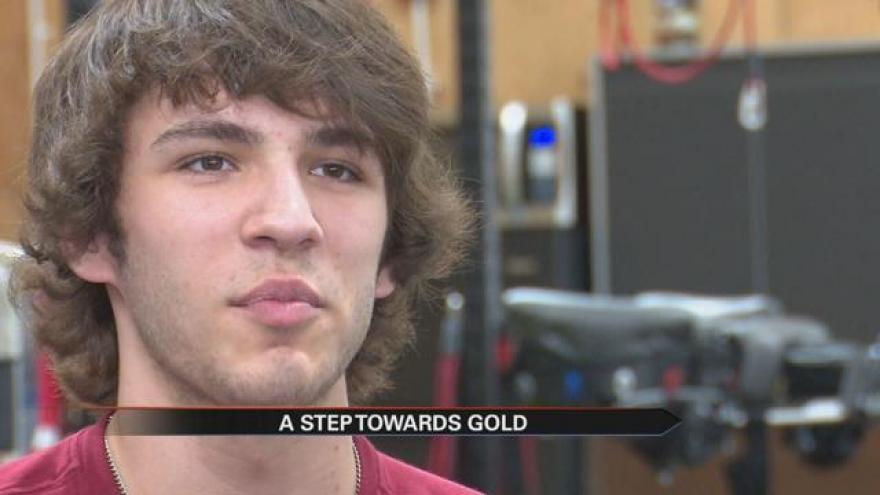A step towards gold: Feranmi Okanlami’s story
Dr. Feranmi Okanlami has made it his life mission to help others with disabilities.
He uses the catch phrase "disabusing disability" as a way to start the conversation.
"My goal is to shed light right now on disability and people with limited motilities or abilities - to show that they are just as able as others," Dr. Okanlami said.
Dr. Okanlami is working hard to be a prime example of that. He also hopes to inspire people to maximize their potential.
"Even though you need a wheelchair or crutches or a walk, it doesn't make any difference," Dr. Okanlami said.
Dr. Okanlami wasn't always in a wheelchair. In fact, he excelled in several sports and ultimately ran track at Stanford University.
At a young age, he always knew that he wanted to practice medicine. After graduating from Stanford, Dr. Okanlami went to the University of Michigan. He was in his orthopedic surgery residency program at Yale, when he was in a swimming accident.
"A lot of the residents at Yale were there having a 4th of July gathering," Dr. Okanlami said. "I jumped into a pool and everyone always asks me if the pool was too shallow. And I always tell people the pool's depth did not change at all. It wasn't the pool's fault in any way. I jumped in. I didn't do a back flip or triple flip forward. There was no diving board. I either hit the ground or hit the side of someone's leg. I can't be entirely sure, but immediately I was unable to move my legs."
Dr. Okanlami broke his neck. He was paralyzed from the neck down.
"I was almost blissfully ignorant of the things going on at the time, even though I knew the severity of things," Dr. Okanlami said. "I know that I wasn't able to move anything below my chest."
It was clear that Dr. Okanlami had a long and difficult road ahead of him.
His recovery led him back home to South Bend where he continued rehab with the support of close family and friends.
That's where he said the community welcomed him with open arms. He was given several new opportunities, including being appointed to the board of health by South Bend Mayor Pete Buttigieg.
He also participated in the River City Rollers basketball team, ultimately becoming the coach. His team has a strong relationship with area businesses.
Nafe Alick from Alicks Home Medical signed on to help support the team financially.
He also attended the University of Notre Dame and graduated from the ESTEEM Master's program.
In fact, his family recently announced the Okanlami Fellowship, which will be awarded annually to a physician seeking to attend the ESTEEM Graduate Program at Notre Dame. One physician per year will be chosen from a pool of applicants who have shown outstanding performance and strong leadership qualities.
Dr. Okanlami got a spot in the residency program at Memorial Hospital in South Bend. He is set to graduate at the end of this year.
While things in his professional life were back on track, it started taking a toll on his body. Residents work long hours, which meant Dr. Okanlami spent long hours in his chair and less time at rehab.
"We knew it was going to be hard and honestly he slipped back," said Dale Patterson, medical director at Memorial Family Medicine Residency Program. "He didn't go to the gym as much as he should have and he came in one day and said he realized he was backing up."
At that point, he knew that he needed to do something drastic. After extensive research and a little faith, Dr. Okanlami took leave from the hospital and took a trip out west.
ABC 57 News followed Dr. Okanlami to California, to a rehab facility called Project Walk.
"My theme for my time out here was going for the gold, a little pun off the face that I used to run track," Dr. Okanlami said. "The first time I did my rehab, I had red shoes that a lot of people recognized. So I thought I needed to step it up this time and go for the gold with the track theme."
It's a theme he brought with him to Project Walk, an activity based therapy designed to help people learn how to reboot, control and coordinate their nervous system.
He worked closely with Jeff Lefkovitz, who runs Project Walk LA.
"From the first day that he was here, he really pushed himself, no limits," Lefkovitz said. "He pushed himself. When he was tired, he wanted to keep going."
Lefkovitz said Dr. Okanlami has the ability to change lives and a platform to make a difference with anyone facing a disability.
After six weeks of intense training, Dr. Okanlami reached his goal. He was able to take several unassisted steps.
No trophy or medal needed for Dr. Okanlami. He wants to use his accomplishments in California to show others that disability does not mean inability.
It's a lesson that starts on the playground with his son.
"What I'm trying to show him is, yes, you can try your best because you always want to do your best, but that people are different," Dr. Okanlami said. "There will be times when you aren't the fastest and that's okay. There will be times you won't be the strongest and that's alright, too."
As for his future, Dr. Okanlami accepted a position at the University of Michigan, where he will be providing primary care for individuals with disabilities.
He will also serve as a mentor for underrepresented minorities and students with disabilities, while teaching and conducting research.
He will be a part of several departments, including family medicine, physical medicine and rehabilitation and the office for health equity and inclusion.





